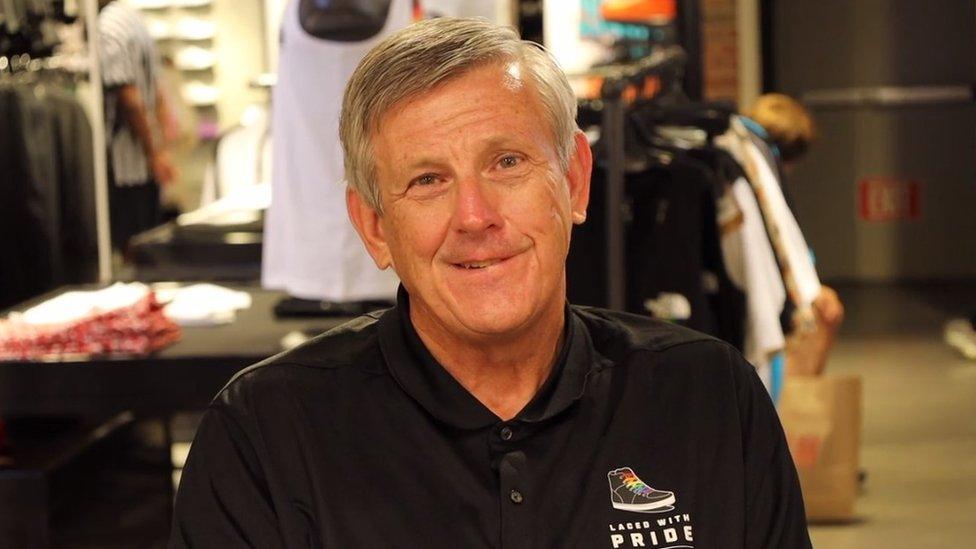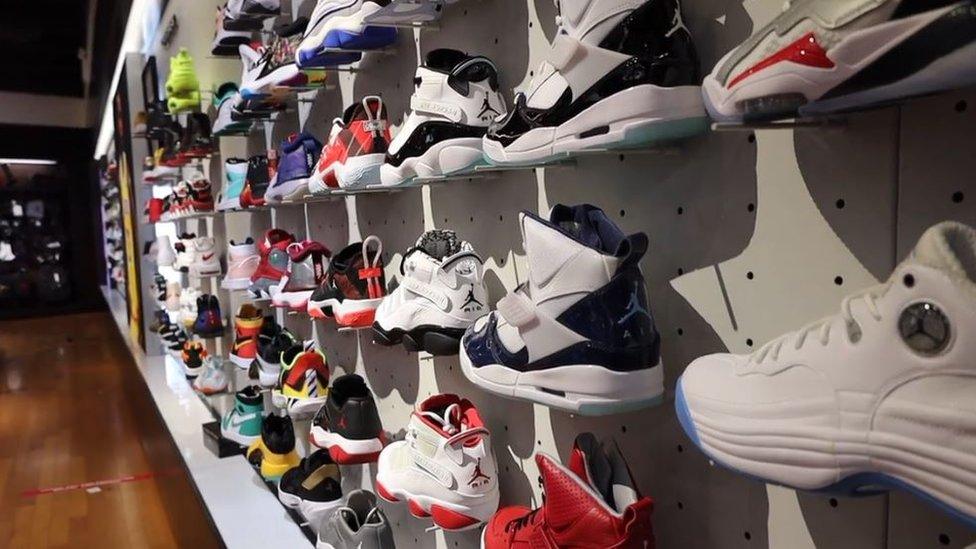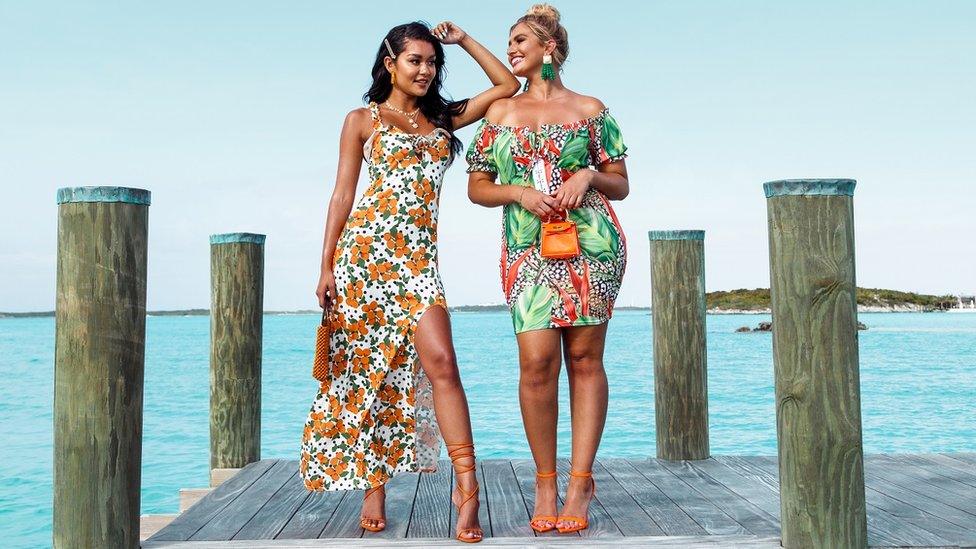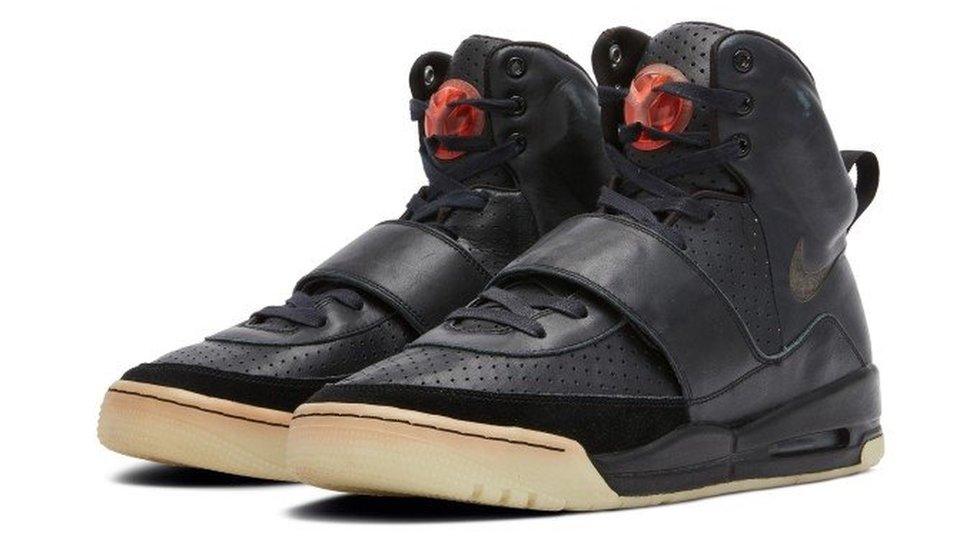Foot Locker boss says casual wear is here to stay
- Published

Richard Johnson has overseen Foot Locker as chief executive since 2014
As you might expect, the boss of one of the world's best-known footwear retailers has a lot of trainers in his wardrobe.
Some Asics Kayanos or On's 'Clouds' shoes for jogging, others for heading to work... And even a dedicated pair for funerals.
"I'm a believer you can wear sneakers every single day," Richard Johnson, the chairman and chief executive of Foot Locker, tells BBC News.
"I have my wedding sneakers, my baptism sneakers - I even have my funeral sneakers because I'm getting up in age and you've got to have the right shoes."
He's not worried about people leaving their joggers and trainers to the side as they return to school or the office either.
Demand for cosy clothes during the pandemic has brought the "casualisation" of fashion to a whole new level, he says.
"As people do go back, I think their wardrobe will change, their uniform will change a bit.
"But I don't think it'll go back to 'more formal'. I think it will still be fairly casual, it will be a new level of business casual in my opinion."
The company has seen sales of fleeces, trainers and T-shirts jump as consumers have opted for comfort during lockdown.
In the three months to 1 May, like-for-like sales, which strip out the effect of new shops opening, jumped by 80.3%.
Online revenues also increased by 43% - although that's starting to fall back slightly, Mr Johnson says.
Digital shift
"Our customer really is born with a digital device in their hand", he says.
"Prior to the pandemic, about 15% of them chose to buy either through the app or online. During the height of the pandemic, it was about 35% to 40% because we always had some stores open somewhere.
"But as they've opened, we've seen it start to retrench into the low to mid-20s... Our customer likes to explore the stores, they like to pull the shoes out of the box - and they're out and about. It's a nice balance."

Foot Locker has 3,000 stores worldwide, including about 60 in the UK
But Foot Locker, which has a global footprint of 3,000 stores, and brands such as Champs and Eastbay, has recently weighed up how many shops it wants.
In May, it decided to close the Footaction chain in the US, citing too much overlap with Foot Locker's customer base, without bringing as many sales in.
Most of the 231 Footaction shops will be shut, although some will be converted into Foot Locker stores.
Mr Johnson said: "It's never an easy decision to make to close a banner down, but we're trying to relocate the people across the banners," with positions being sought elsewhere for sales assistants and those in the corporate office.
Catherine Shuttleworth, retail analyst and chief executive at retail marketing agency Savvy, said that the New York athletic chain had, overall, seen a strong performance throughout the pandemic.
"With a shopper base who were already online fans, they were able to switch quickly from bricks to clicks in lockdown. Alongside other players in the market they have benefitted from ongoing spend by shoppers - especially in the area of athleisure."
She added that despite the slowdown in online sales, "with the right brand partners, social strategy and positive attitude from younger shoppers, the future should be positive."
And demand among "sneakerheads" shows little sign of slowing down.
Some have queued up for hours to get their hands on the latest releases of Yeezys or Air Jordans.
Many wear them with pride, but others hang on to popular trainers so they increase in value and they can be "flipped", or sold for a profit elsewhere online. Prices sometimes top thousands of dollars.
Foot Locker invested $100m (£77.1m) in a resale site called Goat in 2019, which also sells rare releases from years ago, but Mr Johnson describes resales as a "difficult" eco-system.
"The sneaker market is really driven by scarcity - that's what ultimately fuels the secondary market," he said.
"So if people are passionate about that specific sneaker, there is always somebody that wants it that doesn't have it. Prices and value are in the eye of the beholder."
And as the economy reopens, Mr Johnson feels positive that consumers will keep their eyes on the newest releases.
"[Customers] can go to festivals, they can go to football matches, they can do a lot of different things. But they're always going to want to look good, and that's why I really believe the sneaker heat just continues to come out."
- Published15 June 2021

- Published26 April 2021
